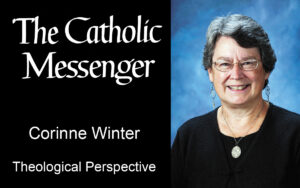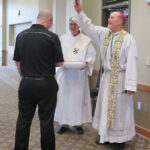By Corinne Winter
We usually celebrate the feast of St Francis of Assisi on Oct. 4. This year it falls on a Sunday, which means the Liturgy of the Eucharist takes precedence. Many people will mark the feast day in some way. St. Francis is popular, even among people for whom devotion to saints is not part of their spiritual lives. He is associated with love of nature, especially of animals. I have found his statue in virtually every garden shop I have visited, and his prayer for peace may be as familiar to people as Footprints in the Sand or the Serenity prayer.
 Popularity may sometimes cloak the depth of his messages for today. If one reads carefully the prayer for peace, for example, one hears a call to attitudes of humility and generosity, which, if observed, would make a profound difference in some of what we see happening today. What would happen if we all strove to spread love in place of hatred, pardon for injury and hope for despair?
Popularity may sometimes cloak the depth of his messages for today. If one reads carefully the prayer for peace, for example, one hears a call to attitudes of humility and generosity, which, if observed, would make a profound difference in some of what we see happening today. What would happen if we all strove to spread love in place of hatred, pardon for injury and hope for despair?
In this prayer and in other writings, Francis called his brothers and all Christians to behave humbly. Today, some people become nervous when they hear the word “humility” because they associate it with lack of self-worth and with failure to be assertive. However, Francis and his followers were willing to stand up, preaching by both word and example the Truth for which they saw a tremendous need in their times. The humility that Francis taught is recognition of the truth about one’s place before God, among one’s brothers and sisters, and within creation. Armed with that truth, one can live in right relationship with oneself and others.
A second prayer by St. Francis is familiar at least for a few of its lines: “The Canticle of Brother Son.” In that prayer, Francis speaks of the utter transcendence of God to whom alone belong honor, glory and praise. All of creation is described as belonging to God (and not to us) and set around us as a divine gift and a reflection of God’s goodness. The prayer describes the earth as “sustain[ing] and govern[ing] us. We are reminded of our mortality and of our eternal destiny. The prayer concludes “Praise and bless my Lord and give him thanks and serve him with great humility.”
St. Francis lived and taught the virtue of voluntary poverty as a way to be free from undue influences of either material desires or political ambitions. In a testament written near the end of his life, he spoke of having experienced a kind of conversion by working among lepers. In other writings to his community, he exhorted them always to love enemies, caring deeply for their eternal good, to practice patience in affliction, to accept correction and learn from it. All should, he said, follow the example of St. Paul by boasting only in the cross. One never seeks a position of leadership for the sake of honor but accepts such a position only out of a desire to serve, recognizing one’s abilities as gifts of God’s grace.
We know, for example, that we are using up natural resources and polluting air, water and land at an alarming rate. Integrating Francis’ high regard for the natural world as God’s gift could help us re-evaluate our understanding of our own place in creation. We do not hold ownership rights over other creatures. They belong to God and show forth God’s greatness. We are members of the community of creation, called to care about all. Whether or not we can heal the damage already done, exercising greater care for the environment places us in right relationship.
We also live in a world marked by divisions among people. Many of these divisions have to do with people’s conflicting sense of their rights: rights to property, to various freedoms, to a voice. What would happen if we placed a greater emphasis on service? What would happen if we viewed the needs and rights of others as equally important with our own? Catholic social teaching calls us to solidarity with others. As long as any in our world do not flourish then none of us truly flourishes.
If, inspired by Francis’ call to voluntary poverty, we chose to live more simply we would have a better sense of what we truly need and what we only want. So inspired, we could make better choices with respect to creation and to one another.
A prayer for an end to racism on the U.S. Conference of Catholic Bishops’ website (www.usccb.org) includes the exhortation from the prophet Micah that what is necessary is to “do justice and to love goodness, and to walk humbly with your God.” The work of St. Francis provides more than lovely decorations for our gardens and walls. It challenges us to adopt attitudes that lead toward right relationships described in the prophetic words.











